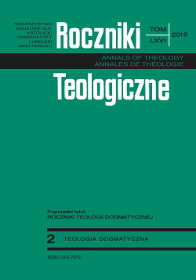Teologiczne rozumienie małżeństwa osób ochrzczonych a niewierzących
Abstrakt
Małżeństwo jest z ustanowienia Bożego, gdyż wywodzi się z Bożego zamysłu stworzenia i wyraża się w dwóch podstawowych motywach stworzenia: dawania życia i miłości (por. Rdz 2,7; 1,27; 2,18), by w ten sposób tworzyli communio personarum – nierozerwalne „jedno ciało”, które przyjmuje na ziemi udział w Bożym akcie continua creatio. Bóg zatem stworzył człowieka na swój obraz i podobieństwo jako „jedno ciało” dwuosobowe, realizujące Jego miłość i twórczość (stworzenie; potomstwo). I choć załamało się pierwsze małżeństwo edeniczne, to jednak w ich potomstwie wątek stwórczy związania stworzenia i miłości Bożej nie zaginął. Tak więc najgłębszą podstawą małżeństwa jest naturalny akt stwórczy Boga, a jego sakramentalność jest aktem zbawczym, dokonanym przez Chrystusa. Tak Chrystus podniósł małżeństwo naturalne do godności sakramentu.
Dziś chrześcijanie zawierają związki małżeńskie, w których coraz częściej pojawiają się przypadki, że brak im wiary w to, co czyni Kościół (intencja), albo wprost odrzucają wiarę. Określamy ich jako osoby ochrzczone a niewierzące. Przez swoją niewiarę nie tracą jednak wątku stwórczego i miłości Bożej. Zachowują więc sakramentalność zawartego związku małżeńskiego na mocy ich chrztu i udzielania łaski ex opere operato. Osobista wiara zawierających małżeństwo nie konstytuuje bowiem sakramentalności małżeństwa, a jedynie wpływa na jego owocność. Także wymagana intencja nupturientów – intencja czynienia tego, co czyni Kościół – która jest minimalnym koniecznym warunkiem do zawarcia związku sakramentalnego, rodzi się z wiary, a brak osobistej wiary może wpłynąć na ważność sakramentu. Toteż ochrzczeni niewierzący, którzy zawierają związek małżeński bez osobistej wiary i intencji czynienia tego, co czyni Kościół, nie zawierają małżeństwa czysto naturalnego. „Dla Kościoła bowiem, między dwojgiem ochrzczonych, nie istnieje małżeństwo naturalne oddzielone od sakramentu, lecz jedynie małżeństwo naturalne podniesione do godności sakramentu” (Międzynarodowa Komisja Teologiczna, Doktryna katolicka o sakramencie małżeństwa, s. 98). Tak Kościół warunkuje życie duchowe tych wszystkich jego członków, wiąże w jedną organiczną całość, spełnia ich i jak najdoskonalej personalizuje tak, że wszyscy chrześcijanie są kimś jednym w Chrystusie Jezusie (por. Ga 3,28).
A zatem ochrzczeni, ale już niewierzący, mogą mieć małżeństwo sakramentalne i nierozerwalne w Kościele katolickim, który też zaradza niedostatkom ich wiary (Ecclesia suplet). Brak żywej i osobistej wiary pozbawia małżeństwo wprawdzie owoców sakramentalnych, ale nie wyklucza – z racji chrztu – z Kościoła, jak też nie wyklucza i z tej racji, że małżeństwo w ogóle jest z woli Bożej (por. Rdz 1,27; 2,24).
Bibliografia
Augustyn, Epistula 140,18 PL 33, 545; Enarr. in Ps 142,3 PL 37,1845-1846.
Bartnik Cz.S., Personalizm, Wydawnictwo KUL, Lublin 2013.
Bartnik Cz.S., Wiara Kościoła, „Collectanea Theologica” 51(1989), nr 6, s. 107-114.
Bartnik Cz.S. „Osoba” w filozofii i teologii, „Standruk”, Lublin 2017.
Benedykt XVI, Incontro con il clero della diocesi di aosta. Discorso di sua santità Benedetto XVI Chiesa parrocchiale di Introd (Valle d'Aosta), 25 luglio 2005: https://w2.vatican.va/content/ benedict-xvi/it/speeches/2005/july/documents/hf_ben-xvi_spe _20050725_diocesi-ao sta.html (dostęp: 12.12.2018).
Dalhai L., Fede e sacramenti, „Folia Athanasiana” 17(2015), s. 67-91.
Góźdź K., Die personalistische Ergänzung des Chalkedonischen Dogmas, w: Ch. Schaller i in. (red.), Mittler und Befreier. Die christliche Dimension der Theologie, Herder, Freiburg i.Br. 2008, s. 94-109.
Góźdź K., Realność i racjonalność wiary, w: tenże, Logos i Miłość. Teologia Josepha Ratzingera-Benedykta XVI, Wydawnictwo KUL, Lublin 2018, s. 93-103.
Góźdź K., Świętojańskie zjednoczenie historii z Transcendencją w wydarzeniach Kany i Golgoty, w: K. Wieliczko (red.), Matka Odkupiciela, Lublin 2006, s. 37-46.
Ireneusz z Lyonu, Adv. haer. IV, 38.
Jan Paweł II, Adhortacja apostolska Familiaris consortio, Watykan 1981.
Jan Paweł II, Encyklika Evangelium vitae, Watykan 1995.
Janczewski Z., Małżeństwo niesakramentalne chrześcijan, „Ius Matrimoniale” 12 [18] (2007), s. 35-49.
Kongregacja Nauki Wiary, Instrukcja o szacunku dla rodzącego się życia ludzkiego i o godności jego przekazywania Donum vitae, Watykan 1987.
Królikowski J., Credo – Credimus. Wymiary przedmiotowe aktu wiary, Wydawnictwo Naukowe UPJPII, Kraków 2018.
La doctrina católica sul sacramento del matrimonio, w: Commissione Teologica Internationale, Documenti 1969-2004, Edizioni Studio Domenicano, Bologna 2010, s. 137-163.
Menke K.H., Sakramentalität. Wesen und Wunde des Katholizismus, Werlag Friedrich Pustet, Regensburg 20122.
Międzynarodowa Komisja Teologiczna, Doktryna katolicka o sakramencie małżeństwa, w: Od wiary do teologii. Dokumenty Międzynarodowej Komisji Teologicznej 1969-1996, red. J. Królikowski, Wydawnictwo Księży Sercanów, Kraków 2000, s. 89-110.
Müller G.L., Dogmatyka katolicka, przekł. W. Szymona OP, Wydawnictwo WAM, Kraków 2015.
Papież Franciszek, Amoris laetitia, 75.
Papież Franciszek, Przemówienie do Roty Rzymskiej (22.01.2016) https://opoka.org.pl/bib lioteka/W/WP/franciszek_i/przemowienia/rota_22012016.html (dostęp: 12.12.2018).
Pius XII, Encyklika Mystici Corporis, Watykan 1943.
Ratzinger J., Eklezjalna postać wiary, w: tenże, Opera Omnia, t. IV: Wprowadzenie do chrześcijaństwa. Wyznanie – Chrzest – Naśladowanie, przekł. R. Biel, M. Górecka, red. K. Góźdź, M. Górecka, Wydawnictwo KUL, Lublin 2017, s. 80-92.
Ratzinger J., Kościół jako miejsce przepowiadania, w: tenże, Opera Omnia, t. IX/2: Wiara w Piśmie i Tradycji. Teologiczna nauka o zasadach, przekł. J. Merecki SDS, red. K. Góźdź, M. Górecka, Wydawnictwo KUL, Lublin 2018, s. 783-793.
Ratzinger J., O duszpasterstwie rozwiedzionych, którzy zawarli nowe związki małżeńskie, w: Kongregacja Nauki Wiary, Documenti i Studi, 17: O zastrzeżeniach dotyczących nauki Kościoła na temat przyjmowania komunii św. przez wiernych rozwiedzionych, którzy zawarli nowe związki małżeńskie, https://opoka.org.pl/biblioteka/W/WR/kongregacje/kdwia ry/ratzinger_intro-roz1998.html (dostęp: 12.12.2018).
Ratzinger J., Opera Omnia, t. IX/1: Wiara w Piśmie i Tradycji. Teologiczna nauka o zasadach, przekł. J. Merecki SDS, red. K. Góźdź, M. Górecka, Wydawnictwo KUL, Lublin 2018, s. 39-345.
Ratzinger J., Taufe und Formulierung des Glaubens, „Ephemerides theologice Lovaniensis” 49(1973), s. 76-86.
Rychlicki Cz., Sakramentalny charakter przymierza małżeńskiego. Studium teologicznodogmatyczne, Płocki Instytut Wydawniczy, Płock 1997.
Wojtyła K., Rodzicielstwo a „communio personarum”, „Ateneum Kapłańskie” 67(1975), t. 84, z. 1, s. 17-31.
Wojtyła K., Rodzina jako „communio personarum”. Próba interpretacji teologicznej, „Ateneum Kapłańskie” 66(1974), t. 83, z. 3, s. 347-361.
Copyright (c) 2019 Roczniki Teologiczne

Utwór dostępny jest na licencji Creative Commons Uznanie autorstwa – Użycie niekomercyjne – Bez utworów zależnych 4.0 Międzynarodowe.





